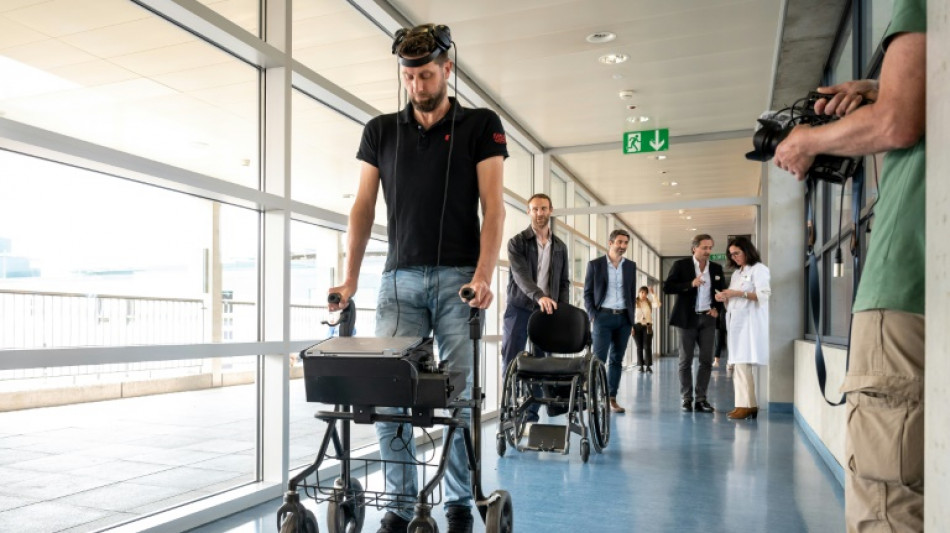
-
 US Republicans begin push to hold Clintons in contempt over Epstein
US Republicans begin push to hold Clintons in contempt over Epstein
-
Trump says agreed 'framework' for US deal over Greenland

-
 Algeria's Zidane and Belghali banned over Nigeria AFCON scuffle
Algeria's Zidane and Belghali banned over Nigeria AFCON scuffle
-
Iran says 3,117 killed during protests, activists fear 'far higher' toll

-
 Atletico frustrated in Champions League draw at Galatasaray
Atletico frustrated in Champions League draw at Galatasaray
-
Israel says struck Syria-Lebanon border crossings used by Hezbollah

-
 Snapchat settles to avoid social media addiction trial
Snapchat settles to avoid social media addiction trial
-
'Extreme cold': Winter storm forecast to slam huge expanse of US

-
 Jonathan Anderson reimagines aristocrats in second Dior Homme collection
Jonathan Anderson reimagines aristocrats in second Dior Homme collection
-
Former England rugby captain George to retire in 2027

-
 Israel launches wave of fresh strikes on Lebanon
Israel launches wave of fresh strikes on Lebanon
-
Ubisoft unveils details of big restructuring bet

-
 Abhishek fireworks help India beat New Zealand in T20 opener
Abhishek fireworks help India beat New Zealand in T20 opener
-
Huge lines, laughs and gasps as Trump lectures Davos elite

-
 Trump rules out 'force' against Greenland but demands talks
Trump rules out 'force' against Greenland but demands talks
-
Stocks steadier as Trump rules out force to take Greenland

-
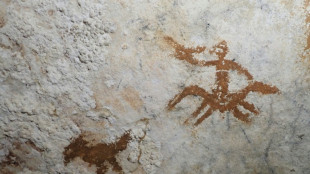 World's oldest cave art discovered in Indonesia
World's oldest cave art discovered in Indonesia
-
US hip-hop label Def Jam launches China division in Chengdu

-
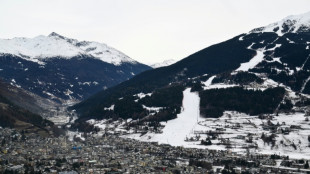 Dispersed Winter Olympics sites 'have added complexity': Coventry
Dispersed Winter Olympics sites 'have added complexity': Coventry
-
Man City players to refund fans after Bodo/Glimt debacle

-
 France's Lactalis recalls baby formula over toxin
France's Lactalis recalls baby formula over toxin
-
Pakistan rescuers scour blaze site for dozens missing

-
 Keenan return to Irish squad boosts Farrell ahead of 6 Nations
Keenan return to Irish squad boosts Farrell ahead of 6 Nations
-
US Treasury chief accuses Fed chair of 'politicising' central bank

-
 Trump rules out force against Greenland but demands 'immediate' talks
Trump rules out force against Greenland but demands 'immediate' talks
-
Israeli strike kills three Gaza journalists including AFP freelancer

-
 US Congress targets Clintons in Epstein contempt fight
US Congress targets Clintons in Epstein contempt fight
-
Huge lines, laughs and gasps as Trump addresses Davos elites

-
 Trump at Davos demands 'immediate' Greenland talks but rules out force
Trump at Davos demands 'immediate' Greenland talks but rules out force
-
Australia pauses for victims of Bondi Beach shooting

-
 Prince Harry says tabloid coverage felt like 'full blown stalking'
Prince Harry says tabloid coverage felt like 'full blown stalking'
-
Galthie drops experienced trio for France's Six Nations opener

-
 Over 1,400 Indonesians leave Cambodian scam groups in five days: embassy
Over 1,400 Indonesians leave Cambodian scam groups in five days: embassy
-
ICC rejects Bangladesh's plea to play T20 World Cup matches outside India

-
 Prince Harry says UK tabloid court battle in 'public's interest'
Prince Harry says UK tabloid court battle in 'public's interest'
-
Trump lands in Davos to push Greenland claims

-
 Balkan wild rivers in steady decline: study
Balkan wild rivers in steady decline: study
-
Injured Capuozzo misses out on Italy Six Nations squad

-
 Mourners pay last respects to Italian icon Valentino
Mourners pay last respects to Italian icon Valentino
-
EU parliament refers Mercosur trade deal to bloc's top court

-
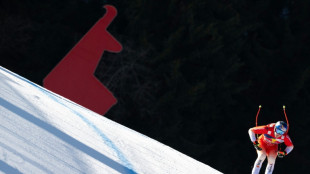 Odermatt seeks first Kitzbuehel victory with eye on Olympics
Odermatt seeks first Kitzbuehel victory with eye on Olympics
-
Italy's Brignone to be rested for Spindleruv Mlyn giant slalom

-
 Alcaraz spearheads big names into Australian Open third round
Alcaraz spearheads big names into Australian Open third round
-
European stocks dip ahead of Trump's Davos speech

-
 Trump flies into Davos maelstrom over Greenland
Trump flies into Davos maelstrom over Greenland
-
EU won't ask Big Tech to pay for telecoms overhaul

-
 Railway safety questioned as Spain reels from twin train disasters
Railway safety questioned as Spain reels from twin train disasters
-
Marcell Jacobs back with coach who led him to Olympic gold

-
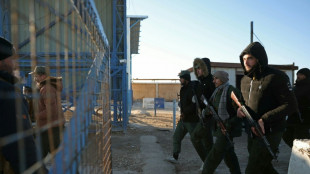 Syria army enters Al-Hol camp holding relatives of jihadists: AFP
Syria army enters Al-Hol camp holding relatives of jihadists: AFP
-
Brook apologises, admits nightclub fracas 'not the right thing to do'


Paralysed man walks again via thought-controlled implants
A paralysed man has regained the ability to walk smoothly using only his thoughts for the first time, researchers said on Wednesday, thanks to two implants that restored communication between brain and spinal cord.
The patient Gert-Jan, who did not want to reveal his surname, said the breakthrough had given him "a freedom that I did not have" before.
The 40-year-old Dutchman has been paralysed in his legs for more than a decade after suffering a spinal cord injury during a bicycle accident.
But using a new system he can now walk "naturally", take on difficult terrain and even climb stairs, according to a study published in the journal Nature.
The advance is the result of more than a decade of work by a team of researchers in France and Switzerland.
Last year the team showed that a spinal cord implant -- which sends electrical pulses to stimulate movement in leg muscles -- had allowed three paralysed patients to walk again.
But they needed to press a button to move their legs each time.
Gert-Jan, who also has the spinal implant, said this made it difficult to get into the rhythm of taking a "natural step".
- 'Digital bridge' -
The latest research combines the spinal implant with new technology called a brain-computer interface, which is implanted above the part of the brain that controls leg movement.
The interface uses algorithms based on artificial intelligence methods to decode brain recordings in real time, the researchers said.
This allows the interface, which was designed by researchers at France's Atomic Energy Commission (CEA), to work out how the patient wants to move their legs at any moment.
The data is transmitted to the spinal cord implant via a portable device that fits in a walker or small backpack, allowing patients to get around without help from others.
The two implants build what the researchers call a "digital bridge" to cross the disconnect between the spinal cord and brain that was created during Gert-Jan's accident.
"Now I can just do what I want -- when I decide to make a step the stimulation will kick in as soon as I think about it," Gert-Jan said.
After undergoing invasive surgery twice to implant both devices, it has "been a long journey to get here," he told a press conference in the Swiss city of Lausanne.
But among other changes, he is now able to stand at a bar again with friends while having a beer.
"This simple pleasure represents a significant change in my life," he said in a statement.
- 'Radically different' -
Gregoire Courtine, a neuroscientist at Switzerland's Ecole Polytechnique Federale de Lausanne and a study co-author, said it was "radically different" from what had been accomplished before.
"Previous patients walked with a lot of effort -- now one just needs to think about walking to take a step," he told a press conference in the Swiss city of Lausanne.
There was another positive sign: following six months of training, Gert-Jan recovered some sensory perception and motor skills that he had lost in the accident.
He was even able to walk with crutches when the "digital bridge" was turned off.
Guillaume Charvet, a researcher at France's CEA, told AFP this suggests "that the establishment of a link between the brain and spinal cord would promote a reorganisation of the neuronal networks" at the site of the injury.
So when could this technology be available to paralysed people around the world? Charvet cautioned it will take "many more years of research" to get to that point.
But the team are already preparing a trial to study whether this technology can restore function in arms and hands.
They also hope it could apply to other problems such as paralysis caused by stroke.
J.Bergmann--BTB




